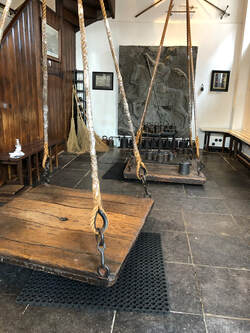 When a thought inside of you whispers: 'you won't make it', 'it's better if you let it go', 'don't make a fool of yourself', or something similar, how do you react? At times it may sound like someone who cares for us and wants to help prevent failure or disappointment. At times it hurts deeply because it suggests that we are not up to living our lives successfully and happily. A commonly used name for this type of thinking is: inner critic. Maybe you've heard of it. Naming these phenomena that tend to interfere with the realization of our plans is a great help. It allows us to identify the phenomenon as existing outside of us. If I call it 'inner critic' I look at it as something that is not me, but it is and I identify it as something I have instead of something I am. This is important because when we listen to these critical thoughts without taking into account the fact that they belong to the inner critic, we can get confused and think that those thoughts are true. Returning to the original question, how do you react when you notice critical thoughts within yourself? Very often we obey what these critical thoughts suggest and take a step back from what we set out to do. The words of the inner critic touch us deeply. Many say that their inner critic has the look, the voice and the way of speaking of people who have had a lot of influence in their life ('it is as if my mother / father were talking to me). Example 1 - I am on vacation and I am offered the opportunity to rent a scooter to explore the area. I haven't driven a scooter in 20 years and critical thinking whispers: 'if you do it will end badly', you think you might ask for help remembering how to ride a scooter, but critical thinking insists you will make a fool of yourself at your age. ask for help with such a thing '. Example 2 - After several therapy sessions to find yourself, you discover that you have a book inside you that wants to be written. We are talking about a big change in your life, a new identity. These are the kind of things that terrify the inner critic. Messages in the form of thoughts, dreams or coincidences then become much more incisive: 'but who do you think you are? Do you think anyone can wake up one morning and become a writer? You would only make a fool of yourself and you would no longer be credible even in what you have been doing for years. ' These are only examples referring to others, they remain far from your personal experience and perhaps the emotional charge of judgment, shame and humiliation that too often accompanies these exchanges of opinion with the inner critic, does not fully transpire from these examples. Then look for your personal example, even a small one, and consider how you reacted. What critical thinking have you noticed recently and how did you react? Have you pulled back and listened to the inner critic? Did you do something else? If you think about it, are you satisfied with how you reacted? Would you do it again? What are the considerations you make in this regard? Then, if you feel like exploring the possibilities beyond these boundaries imposed by these critical thoughts, ask yourself: What would you do if you no longer listened to critical thoughts? What would you like to pursue? Lara Briozzo
0 Comments
Leave a Reply. |
Categories
All
Archives
July 2024
|
|
Lara Briozzo
It is all about life - Coaching, Psychotherapy & Relationship therapy - kvk 63578611 www.ItIsAllAboutLife.eu; [email protected]; Terms & Conditions Algemene voorwaarden Termini e condizioni Privacy policy Privacyverklaring Informativa privacy Discaimer EN Disclaimer NL Disclaimer IT © Lara Briozzo The texts in this website cannot be copied without authorization De teksten op deze website mogen niet zonder toestemming worden gekopieerd I testi presenti in questo sito non possono essere copiati senza autorizzazione Photo's Flickr |
|

 RSS Feed
RSS Feed
